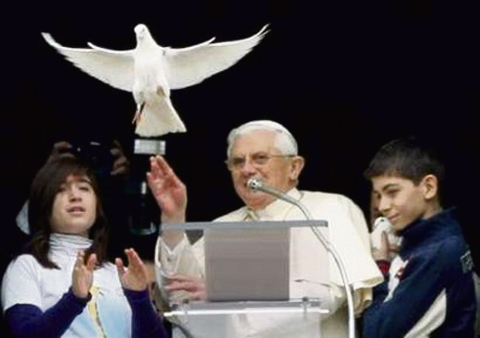BY Ian Dunn | December 21 2012 | ![]() 1 COMMENT
1 COMMENT ![]() print
print

Redefining marriage threatens peace
Publication Date: 2012-12-21
Holy Father highlights danger Scotland faces in his message for the World Day of Peace
Pope Benedict XVI has used his New Year’s message to warn of the danger to world peace posed by same-sex ‘marriage,’ as the Scottish Government prepares to force the redefinition of marriage on this country.
The Vatican released the Pope’s message for the World Day of Peace on January 1, 2013—Blessed are the Peacemakers—last Friday, warning that same-sex ‘marriage’ was a threat to the world’s peace as laws granting legal status for homosexual unions ‘actually harm and help destabilise marriage’ by obscuring its specific nature as a union between man and woman that forms the basis of society and thus destabilises society.
“There is also a need to acknowledge and promote the natural structure of marriage as the union of a man and a woman in the face of attempts to make it juridically equivalent to radically different types of union,” the Pope said. “Such attempts actually harm and help to destabilise marriage, obscuring its specific nature and its indispensable role in society.”
This truth about human nature, the Pope emphasised, is not merely the belief of the Catholic Church, but is ‘inscribed in human nature itself, accessible to reason and thus common to all humanity.’
Scotland
This message has special relevance to Scottish Catholics as the Scottish Government last week announced a consultation on a draft bill to allow same-sex ‘marriage’ in Scotland. Archbishop Philip Tartaglia responded by saying the Scottish Government’s plans for same-sex ‘marriage’ must contain the widest possible protections for religious freedom and that the Church will fully participate in consultations to ensure this.
Speaking in response to First Minister Alex Salmond’s recent announcement of a consultation on a draft bill to allow same-sex couples to marry, the president of the Bishops’ Conference of Scotland said the Church views the move as ‘unwise and unnecessary’ but would participate in the consultation.
Scottish ministers have claimed no part of the religious community would be forced to hold same-sex ceremonies in churches and that they would work with UK ministers to amend equality laws accordingly.
Archbishop Tartaglia, however, said he and the Scottish hierarchy were ‘entirely at one with their colleagues in England and Wales in upholding marriage as a union uniquely of a man and a woman for mutual love and support and open to procreation.’
“The Catholic Church has made its view very clear that the redefinition of marriage is unwise and unnecessary,” Archbishop Tartaglia stated. “The Church will respond fully to the consultation in due course, but remains committed to the belief that legislation to permit same sex ‘marriage,’ enacted in Edinburgh, Westminster, or anywhere else is wrong.”
Archbishop Tartaglia said it is especially important that ‘employment, equality and education law’ be reviewed.
The Scottish Government’s consultation on the draft Marriage and Civil Partnership Bill will run until March 20, 2013.
UK
A total of 58 Members of the Westminster Parliament, from all three main parties, have announced their opposition to the UK Coalition Government’s plans to institute same-sex ‘marriage.’
In a letter to the government, the group said they are ‘united in supporting the institution of marriage defined in law as a union between a man and a woman.’ They added that they ‘recognise the value of a loving and committed relationship,’ and ‘respect civil partnership.’
The group of MPs noted that at the time of the last general election none of the three main parties included a policy of redefining marriage.












I am sorry to note that the Government is persisting in the processing of its extra-manifesto Bill without any reference to the electorate by means of a referendum or plebiscite.
The intention to introduce such a Bill having been concealed by the SNP prior to the election and its proposal to redefine marriage having been comprehensiively rejected in the ensuing Consultation responses by a number of people at least equivalent to the combined memberships of all political parties at Holyrood rendered its introduction democratically invalid and further expenditure of financial and other resources on its promotion irresponsible.